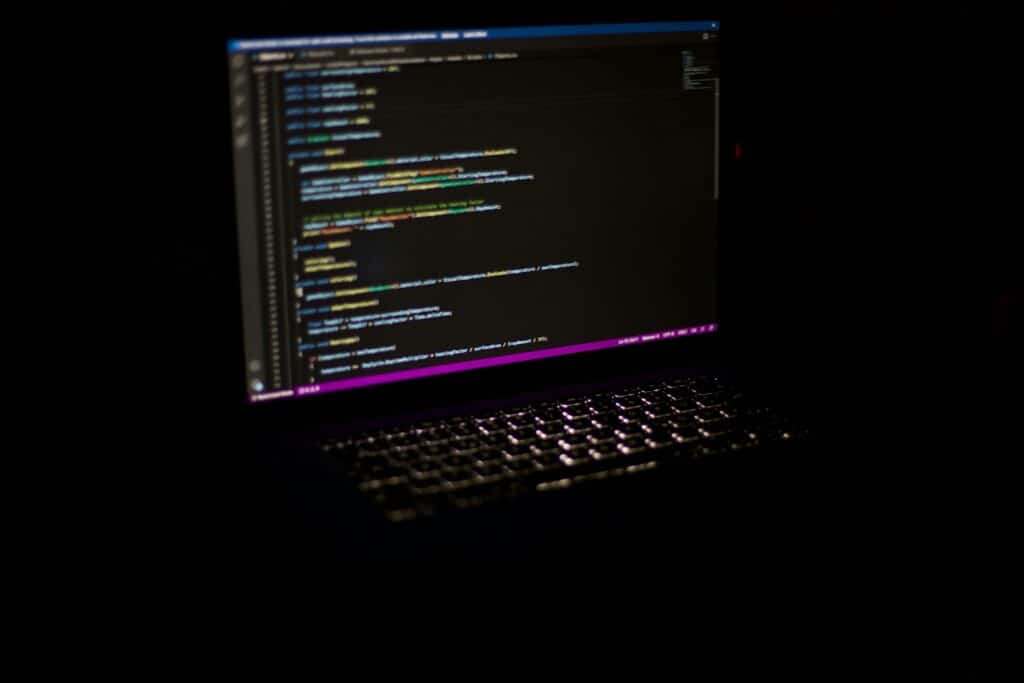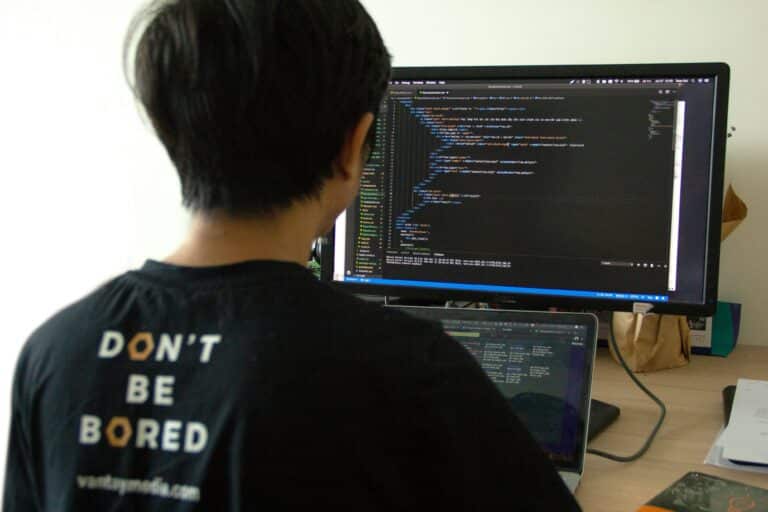In the heart of this digital age, an emerging trend is on the brink of transforming the very fabric of the coding environment – it’s what we call “unplugged” or “distraction-free” coding. Just like a thrilling plot twist in an intriguing novel, it’s time to put a pause on the noise and chaos of multiple screens, endless notifications, and overflowing inboxes.

The ever-changing software landscape calls for innovative, yet simplified, methods of writing and understanding code. One such method is the concept of “unplugged” or “distraction-free” coding, a practice which aims to maximize productivity, improve focus, and facilitate a deeper understanding of programming concepts by minimizing digital distractions. 💻
What to Expect in this Blog Post
Before we delve into the depths of this topic, let’s set some clear expectations. This blog post is not a quick-fix guide to overnight success in coding. Instead, it is an exploration of the philosophy and strategies that underpin distraction-free coding, complete with actionable insights and tips to help you master the art of focused, efficient programming.
Throughout this blog post, we will discuss why the concept of unplugged coding is more relevant than ever in today’s hyper-connected world. We will explore the various challenges that coders often face in a typical coding environment, and how distraction-free coding can be a game changer. 🔥
Why Distraction-Free Coding?
The crux of this blog post revolves around one fundamental question: why distraction-free coding? To answer this question, we need to understand the nature of coding itself. Coding, at its core, is an intellectually challenging task that requires undivided attention and deep focus. However, in the digital world we live in, distractions are aplenty. From constant notifications to the incessant buzz of social media, the digital environment is a minefield of potential disruptions, especially for coders.
Addressing the Elephant in the Room: Digital Distractions
Are digital distractions really that harmful? Well, the short answer is: Yes! And we are going to delve into the reasons behind this. Digital distractions not only hinder productivity, but they can also lead to an increased risk of mistakes, and consequently, lower-quality code.
Unplugged Coding: An Overview
Unplugged coding is all about creating a distraction-free coding environment that allows coders to fully immerse themselves in their work. It promotes focus, increases efficiency, and ultimately, leads to better-quality code. But how exactly does it work? And what strategies can coders employ to implement this practice effectively? Stick around to find out! 👀
So, buckle up as we embark on this fascinating journey to understand and implement the principles of distraction-free coding. Whether you’re a seasoned coder or a novice programmer, there’s something in store for everyone. Let’s begin this exciting exploration into the world of unplugged coding, and discover how it is paving the way for a revolution in the digital age. 🚀
Embracing Unplugged: A Paradigm Shift in Coding
As the world becomes increasingly digitized, it’s easy to get lost in the sheer amount of information at our fingertips. For programmers, this digital inundation can often lead to distraction, affecting productivity and the quality of work. One solution that’s been gaining popularity among coders is the concept of ‘Unplugged Coding’. But what exactly is it, and how can it help streamline the coding process? Let’s delve in.
Unplugged Coding is the practice of coding without the constant interference of the internet, social media, and other digital distractions. Instead of perpetually multi-tasking, programmers who embrace Unplugged Coding focus solely on the task at hand. This allows for more thoughtful, efficient, and accurate work.
Yet, unplugging from the digital world can seem daunting. After all, how do you code without access to online resources and tools? Well, it’s not about completely detaching from the digital world, but rather, selectively choosing when and where to plug in. Think of it as strategic digital minimalism for coders.
Benefits of Unplugged Coding
Unplugged Coding provides a plethora of benefits. It allows for deep work, promoting focus, productivity, and creativity. By eliminating distractions, coders can get into the ‘zone’ more easily, enhancing their problem-solving abilities and innovative thinking. Furthermore, it encourages a healthier work-life balance by drawing clear boundaries between ‘plugged’ and ‘unplugged’ times.
How to Implement Unplugged Coding
Transitioning to Unplugged Coding requires a mindset shift and some practical strategies. Here’s a guide to get you started.
1. Set Clear Boundaries
Start by setting clear digital boundaries. Allocate specific times for ‘plugged’ and ‘unplugged’ work. For instance, you could decide to work unplugged for the first few hours of your day when your mind is fresh and capable of deep work. You can use digital tools during your ‘plugged’ times to research, communicate with team members, and use online coding tools.
2. Prioritize Offline Resources
Make use of offline resources such as textbooks, PDFs, and offline documentation. These can be valuable sources of information, and they encourage more deliberate, thoughtful learning and problem-solving.
3. Develop Strong Note-taking Habits
Effective note-taking is key in Unplugged Coding. Keeping track of your thoughts, ideas, and problems to solve will not only aid your memory but also foster a more organized and systematic approach to coding.
Comparing Unplugged and Plugged Coding
Let’s take a look at how Unplugged Coding compares to traditional ‘plugged’ coding. The table below highlights some of the key differences and benefits.
| Aspect | Plugged Coding | Unplugged Coding |
|---|---|---|
| Focus | Potentially fragmented due to digital distractions. | Enhanced, due to minimal distractions. |
| Efficiency | Can be reduced by multitasking and constant interruptions. | Improved, thanks to deep work and focused tasks. |
| Learning | Surface-level, due to fragmented attention. | Deep and comprehensive, promoting better understanding and retention. |
| Work-Life Balance | Blurred boundaries can lead to burnout. | Clear boundaries promote healthy work-life balance. |
For a deeper understanding of Unplugged Coding and its benefits, check out the YouTube video “The Power of Unplugged Coding” by Developer Advocate (YouTube channel).
Tools for Unplugged Coding
Just because you’re going ‘unplugged’ doesn’t mean you can’t use tools to aid your coding. Here are some offline tools that can support your Unplugged Coding journey.
1. Integrated Development Environments (IDEs)
IDEs like Visual Studio Code, PyCharm, and Eclipse offer offline versions. These IDEs come with built-in features like syntax highlighting, code suggestions, and debugging tools.
2. Offline Documentation
Tools like DevDocs and Zeal provide extensive offline documentation for numerous programming languages and frameworks. Having these at your fingertips can be invaluable when you’re coding offline.
3. Note-taking Apps
Offline note-taking apps like Joplin and Evernote can help keep your thoughts and ideas organized. Plus, these apps often feature markdown support, making it easy to format your notes in a coder-friendly way.
Unplugged Coding: A Path to Greater Productivity and Balance
Unplugged Coding is more than just a trend; it’s a lifestyle choice that can lead to significant improvements in productivity, focus, and work-life balance. By strategically minimizing digital distractions, coders can foster a more conducive environment for deep work and creativity. So, are you ready to unplug?
For more inspiration and tips on Unplugged Coding, watch “Unplugged: How to Code Without Distractions” by Traversy Media (YouTube channel).
Conclusion
As we conclude our deep dive into the intricate world of software engineering, it’s worth recapping the key takeaways from the article. We’ve discussed the fundamental role of software engineering in today’s technology-driven world, we’ve examined how it drives innovation and transformation, and we’ve explored the best practices in software development. Furthermore, we’ve analyzed the pressing issues in software engineering like cybersecurity, artificial intelligence (AI), and the emerging trends in this field.
Software engineering serves as the backbone of our digital ecosystem. As we outlined in the beginning, software engineers play a pivotal role in designing, maintaining, and enhancing the systems we depend on daily. They provide the building blocks for our digital infrastructures, from mobile applications to complex business systems. With the digital transformation only accelerating, the importance of software engineering is set to skyrocket even further. 🚀
Moreover, we delved into the nitty-gritty of software development best practices. We emphasized the significance of a clear and comprehensive planning phase, the use of agile methodologies, and the necessity of frequent testing and reviews. We also underlined the importance of keeping up-to-date with the latest technologies, to ensure the developed software stays relevant and efficient in an ever-evolving digital landscape. 💻
On the security front, we highlighted the importance of proactive cybersecurity measures in software engineering. In an era where data breaches and cyberattacks are rampant, secure coding practices are no longer optional but a necessity. It’s crucial to safeguard sensitive information and maintain trust with end-users. 🔒
We touched on the integration of AI in software engineering, an exciting development that holds immense potential. It can automate mundane tasks, improve code quality, and boost productivity. Yet, it also poses ethical and practical challenges that engineers must navigate carefully. 🤖
In terms of emerging trends, we examined blockchain, DevOps, and cloud-based development. These are shaping the future of software engineering, offering new avenues for innovation and efficiency.
This comprehensive exploration of software engineering underscores its central role in our digital world. It’s a fascinating field, filled with complexities and opportunities, challenges and rewards. As we stand at the precipice of a new technological era, the role of software engineering becomes even more significant.
I encourage you to further explore these topics and apply what you’ve learned in your respective fields. Feel free to comment and share your thoughts and insights on these subjects. Let’s keep the conversation going and continue to learn from each other. After all, that’s how we grow as professionals and as a community.
Please visit the Oxford Reference or the ScienceDirect for more in-depth reading on software engineering.
To conclude, we must remind ourselves of the immense power and responsibility that comes with being a software engineer. It’s our duty to create safe, efficient, and transformative digital solutions that drive progress and better our world. Let’s continue to harness our skills and knowledge, push the boundaries of what’s possible, and shape the future of software engineering. ✨
Keep exploring, keep innovating, and most importantly, keep learning.
Home »



